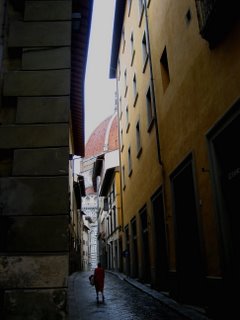
August 14th - Florence-mother of the Renaissance!
Our first morning, early, we flit through the deserted streets, past Tuscany's most recognizable landmark, the red-tiled cupola of Il Duomo (Brunelleschi, 13th century), on to the banks of the Arno.
We turn following this ever-so-civilized bank, past one bridge and then another, the outrageously overbuilt medieval Ponte Vecchio (with one lone gondola secure beneath an arch) and on to the Uffizi (office of the de Medici's), home to the world's
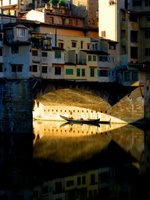 pre-eminent Renaissance museum, hoping to be first in.
pre-eminent Renaissance museum, hoping to be first in.That is not to be. Closed! Today is a holiday. Our introduction to Renaissance Florence will be a little slower than we hoped. That is a good thing.
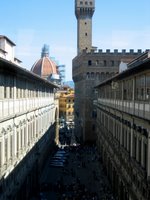
Florence, the city as it now is, despite its tide of tourism, is a jewel, a jewel from morning to night. Florence, the city that was once, is simply beyond
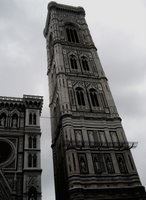 compare. Taken together, Florence overwhelms the unprepared and I was so unprepared.
compare. Taken together, Florence overwhelms the unprepared and I was so unprepared.Slowly now we join with our fellow tour members for a city walk-about, viewing first the spectacular tower of Giotto, (Campanile di Giotto, 1334) and the imposing neo-gothic facade to its associated Cattedrale di Santa Fiore and Il Duomo.
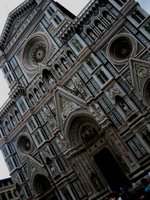
After passing the home of Dante, the Divine Comedy, we wend out way to Piazza Della Signoria, where statues abound. Here is Cellini's Perseus and the head of the Medusa (1545), only one of many in this wonderful, wide open plaza close on the Uffizi. Here too is where Savanarola was burned at the stake in 1498.
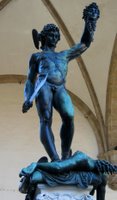
On then to the Bascilica di Santa Croce, a Franciscan Gothic Structure (Cambio, 1294) said to have been instructed by St. Francis himself. Fransican austerity characterizes the interior but not its art and sculpture.
Importantly it is here that I fall into a metaphysical tizzy. It comes to me standing in one spot in the great nave: I am within mere metres of the tombs of Michelangelo, Machiavelli, Dante and Galileo (among others) - a convergence of genius never before nor after
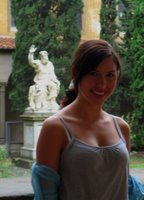 rivalled in our western tradition. Awe descends upon me - awe of these dead, awe for this place.
rivalled in our western tradition. Awe descends upon me - awe of these dead, awe for this place.Later in the adjacent cloistery, Felicity is backgrounded by Bardinelli's God our Father. We decline on the tour to Pisa so that we might see the Pallazzao Pitti and finally, early that evening, to see Florentine food and drink.

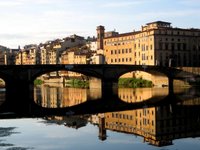
No comments:
Post a Comment